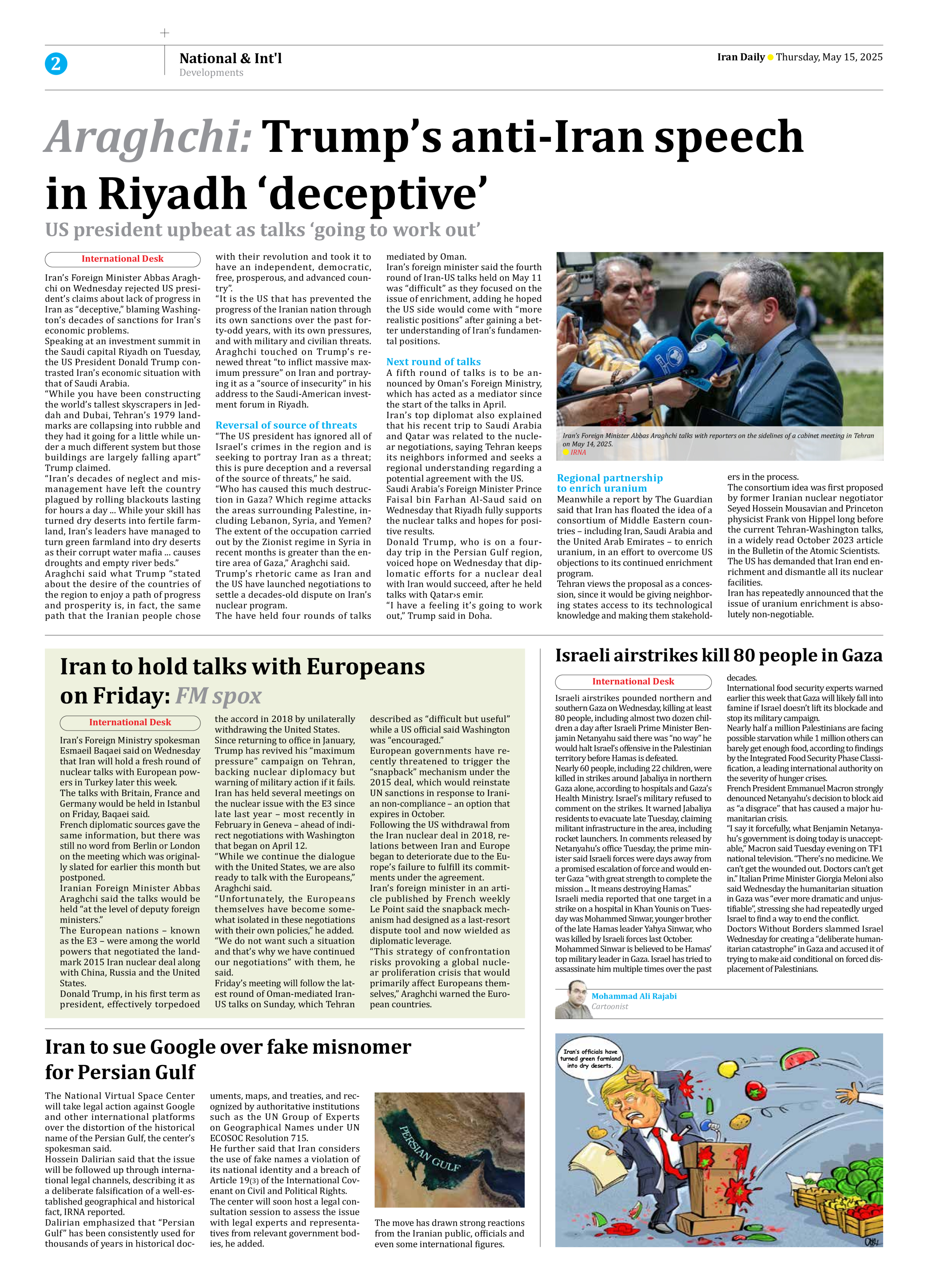
Araghchi: Trump’s anti-Iran speech in Riyadh ‘deceptive’
US president upbeat as talks ‘going to work out’
Iran’s Foreign Minister Abbas Araghchi on Wednesday rejected US president’s claims about lack of progress in Iran as “deceptive,” blaming Washington’s decades of sanctions for Iran’s economic problems.
Speaking at an investment summit in the Saudi capital Riyadh on Tuesday, the US President Donald Trump contrasted Iran’s economic situation with that of Saudi Arabia.
“While you have been constructing the world’s tallest skyscrapers in Jeddah and Dubai, Tehran’s 1979 landmarks are collapsing into rubble and they had it going for a little while under a much different system but those buildings are largely falling apart” Trump claimed.
“Iran’s decades of neglect and mismanagement have left the country plagued by rolling blackouts lasting for hours a day ... While your skill has turned dry deserts into fertile farmland, Iran’s leaders have managed to turn green farmland into dry deserts as their corrupt water mafia ... causes droughts and empty river beds.”
Araghchi said what Trump “stated about the desire of the countries of the region to enjoy a path of progress and prosperity is, in fact, the same path that the Iranian people chose with their revolution and took it to have an independent, democratic, free, prosperous, and advanced country”.
“It is the US that has prevented the progress of the Iranian nation through its own sanctions over the past forty-odd years, with its own pressures, and with military and civilian threats.
Araghchi touched on Trump’s renewed threat “to inflict massive maximum pressure” on Iran and portraying it as a “source of insecurity” in his address to the Saudi-American investment forum in Riyadh.
Reversal of source of threats
“The US president has ignored all of Israel’s crimes in the region and is seeking to portray Iran as a threat; this is pure deception and a reversal of the source of threats,” he said.
“Who has caused this much destruction in Gaza? Which regime attacks the areas surrounding Palestine, including Lebanon, Syria, and Yemen? The extent of the occupation carried out by the Zionist regime in Syria in recent months is greater than the entire area of Gaza,” Araghchi said.
Trump’s rhetoric came as Iran and the US have launched negotiations to settle a decades-old dispute on Iran’s nuclear program.
The have held four rounds of talks mediated by Oman.
Iran’s foreign minister said the fourth round of Iran-US talks held on May 11 was “difficult” as they focused on the issue of enrichment, adding he hoped the US side would come with “more realistic positions” after gaining a better understanding of Iran’s fundamental positions.
Next round of talks
A fifth round of talks is to be announced by Oman’s Foreign Ministry, which has acted as a mediator since the start of the talks in April.
Iran’s top diplomat also explained that his recent trip to Saudi Arabia and Qatar was related to the nuclear negotiations, saying Tehran keeps its neighbors informed and seeks a regional understanding regarding a potential agreement with the US.
Saudi Arabia’s Foreign Minister Prince Faisal bin Farhan Al-Saud said on Wednesday that Riyadh fully supports the nuclear talks and hopes for positive results.
Donald Trump, who is on a four-day trip in the Persian Gulf region, voiced hope on Wednesday that diplomatic efforts for a nuclear deal with Iran would succeed, after he held talks with Qatar›s emir.
“I have a feeling it’s going to work out,” Trump said in Doha.
Regional partnership
to enrich uranium
Meanwhile a report by The Guardian said that Iran has floated the idea of a consortium of Middle Eastern countries – including Iran, Saudi Arabia and the United Arab Emirates – to enrich uranium, in an effort to overcome US objections to its continued enrichment program.
Tehran views the proposal as a concession, since it would be giving neighboring states access to its technological knowledge and making them stakeholders in the process.
The consortium idea was first proposed by former Iranian nuclear negotiator Seyed Hossein Mousavian and Princeton physicist Frank von Hippel long before the current Tehran-Washington talks, in a widely read October 2023 article in the Bulletin of the Atomic Scientists.
The US has demanded that Iran end enrichment and dismantle all its nuclear facilities.
Iran has repeatedly announced that the issue of uranium enrichment is absolutely non-negotiable.







